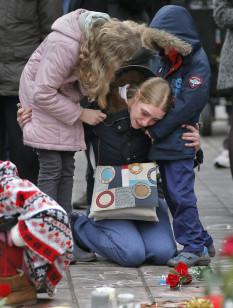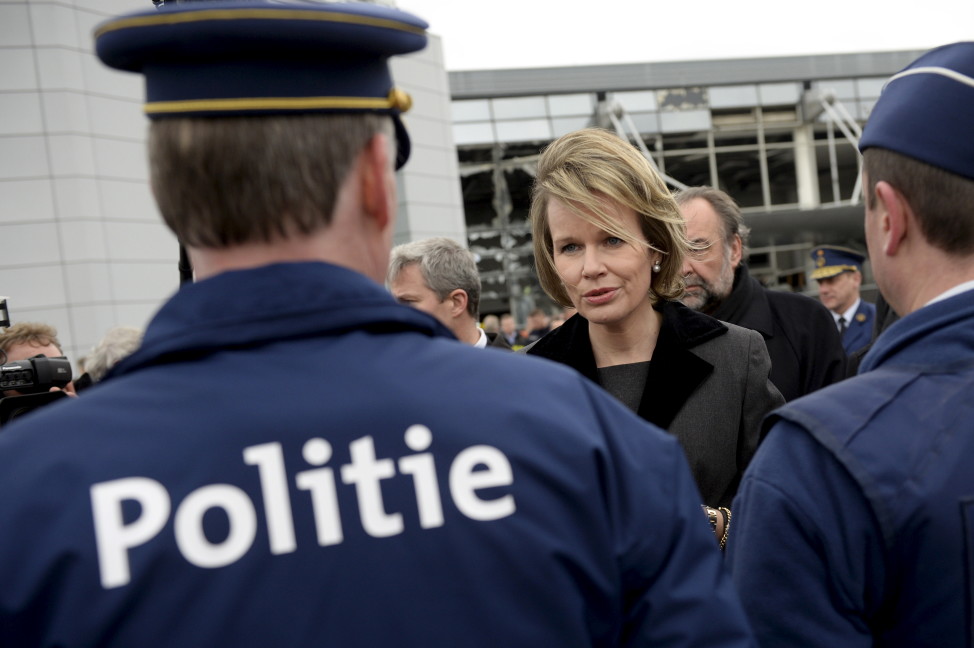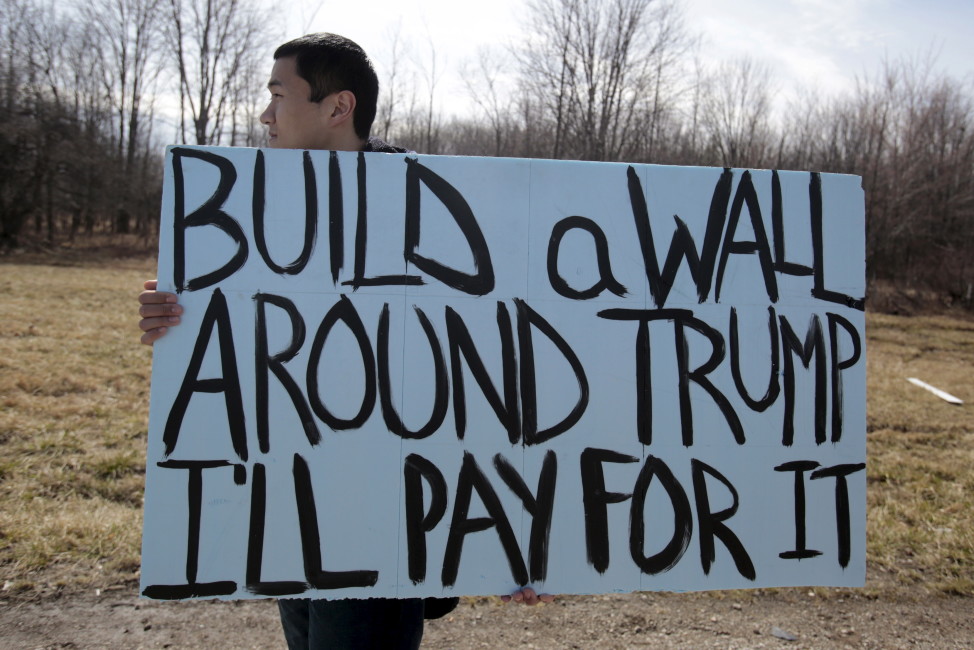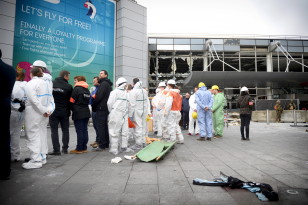“We have been through this two times last year,” a diplomatic official told a VOA reporter. “We have to get used to this.”

A woman consoles her children at a street memorial after the twin bomb attacks in Brussels on March 23, 2016. (Reuters)
The heinous attacks on two soft targets in the heart of the European Union shattered any delusion that acts of terrorism are one-offs.
Amid the horror, came a torrent of criticism, targeting the Belgian government, the effectiveness of EU security apparatus and the Obama administration’s ISIS strategy.
Perhaps the most pressing question right now is what can be done to stop the massacre of innocent people?
In Europe, the French prime minister urged the EU to “invest massively” in security systems.
In the United States, Obama called for unity and resolve.
Trump once again called for a crackdown on Muslims.
And Clinton called for reinforcing alliances and doing away with what she termed “bluster.”

Belgian Queen Mathilde attends a ceremony outside the terminal at Brussels International airport on March 23, 2016. (Reuters)
What Trump and Cruz should Learn from Belgium
Peter Beinart – The Atlantic
Today, American Muslims are far more integrated than Muslims in Europe. According to a 2011 Pew Research poll, only 20 percent of American Muslims surveyed would prefer to “be distinct” than to “adopt American customs.” Half say that many of their friends are non-Muslim. Almost 80 percent rate their community an “excellent” or “good” place to live….
Compared to countries like Belgium, the degree of acceptance that American Muslims enjoy represents a form of American exceptionalism. Republican presidential candidates like to say Barack Obama doesn’t believe in American exceptionalism and instead wants to make America more like Europe. Yet it’s they who, by demonizing Muslims, would do just that.
Brussels Shows Europe’s Shockingly Dysfunctional Approach to Security
David Ignatius – The Washington Post
Europe is facing a security threat that’s unprecedented in its modern history, at a time when its common currency, border security and intelligence-sharing are all under severe stress….
The European Union needs to reinvent its security system. It needs to break the stovepipes that prevent sharing information, enforcing borders and protecting citizens….
Americans, who are less exposed to the threat, may smugly imagine they can wall themselves off. But the Islamic State’s rampage is more an American failure than a European one. The United States formed a global coalition to “degrade and ultimately destroy” the Islamic State back in September 2014. This strategy hasn’t worked; the Islamic State’s domain has shrunk in Iraq and Syria but expanded elsewhere.
Europe’s Fear of ‘Islamaphobia’ Led Directly to the Belgium Attacks
M.G. Oprea – The Federalist
[T]his is a problem of Europe’s own creating—and it’s not going away. Beginning in the post-World War II era, Europe was in need of workers to pad its depleted work force. A natural place to look was North Africa, in former colonies of Spain and France. While it was assumed that migration would be short-term, the reality is that the men who came to work stayed, and later brought over their families. Europe made no plan for how to house and assimilate these families.
Rescuers attends a ceremony outside the terminal at Brussels International airport in Zaventem, Belgium on March 23, 2016. (Reuters)
More to the point, Europe was uncomfortable asking its Muslim communities to assimilate. European leaders felt that would be too reminiscent of the colonial era.
Their guilt and newfound “enlightenment” guided them to leave these people to their communities, culture, and religion. At the same time, however, they also ostracized them. What resulted was tight-knit majority-Muslim enclaves often on the outskirts of major European cities.
The New Normal
Editorial Board – The Economist
How should governments respond?
The starting point is an awareness that terrorists set out to provoke an overreaction. They exult when politicians like Donald Trump vow to exclude Muslims from the United States; when leaders from eastern Europe say they will accept migrants from Syria only if they are Christian…
Another priority—which goes some way to preventing an overreaction—is to reassure ordinary people that the government is working to protect them. Some politicians think that popular fears of perishing in a terrorist attack are irrational. Barack Obama, in a recent interview in the Atlantic, explained how he likes to remind his staff that more Americans die from falling over in the bath. But terrorism is different from accidental death or even from random murder. The public react to terrorism so strongly because they sense that their government cannot fulfil its basic duty to keep them safe from such enemies.
In Brussels, Europe Is Struck at its Heart
Roger Cohen – The New York Times
It is not working. President Obama’s slow-but-steady strategy to defeat the Islamic State is clawing back a little territory in Syria and Iraq but is doing nothing to dent the charismatic appeal of the militant group, disrupt its propaganda or prevent it from killing Europeans….
This is a very high-risk policy — too high in my view. It allows the Islamic State to strut its pure evil in and from Raqqa. The Obama approach posits that the Islamic State can be beaten before European and American societies are undermined. Again today, speaking in Havana, he said, “We will defeat those who threaten the safety and security of people all around the world.” But the president does not say when victory will come against these forces he declined to identify, and time counts.

An anti-Trump protester holds his protest sign outside a rally for Republican presidential candidate Donald Trump in Cleveland, Ohio, March 12, 2016. (Reuters)
After Brussels Attack, It’s Advantage Trump
Michael Goodwin – New York Post
Obama’s mantra has been that America was war-weary, and he would be rewarded for shrinking the nation’s military footprint. While there was some truth to his idea, I have always believed most Americans are not so much war-weary as they are tired of losing wars. And they certainly are tired of living in fear.
If true, then the next president will likely be the candidate who can convince the most voters that he or she can make the nation safe and a winner again. Think of it as a national-security primary, with events in Brussels offering a clear contrast of the candidates’ strengths and weaknesses.
So far, it’s advantage Trump.
The Brussels Bombings Highlight Just How Wrong Trump Is about NATO
James Stavridis – Foreign Policy
The key problem, in Trump’s eyes, seems to be financial: “NATO is costing us a fortune, and, yes, we’re protecting Europe, but we’re spending a lot of money….”
We’ve seen that movie before. After the apocalyptic events of World War I in Europe, the United States departed the continent, declined to join the nascent global organizational structure offered by the League of Nations, and essentially withdrew from the world, judging it to be complicated, expensive, and unnecessary to maintain a policy of wider engagement. The result was the rise of fascism in Europe, the violent expansion of Imperial Japan, and World War II….
As much as we complain about the cost of an alliance system and forward military deployments, they are a necessity if we are to ensure an open global commons, freedom of the high seas, and security around the world, especially in the nations of our allies and friends.


